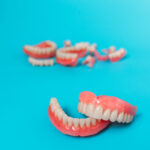Are you finding it difficult to choose between implants and bridges to restore your missing teeth?
Losing a tooth can be a real downer. Not only does it leave a gaping hole in your smile, but it can also make chewing your favorite foods a challenge and leave you feeling a bit self-conscious. The good news? Modern dentistry offers favorable solutions to reclaim your dazzling smile and get your confidence roaring back. The two most common treatments to fix missing smiles are dental implants and dental bridges.
Dental implants and bridges may give similar results, however, both options are vastly different technically. Thus it is crucial for you to know about these options so that you can choose the best treatment among the two for you.
Let us understand dental implants and bridges in brief.
A Brief Introduction About Dental Implant And Its Procedure:
Dental implants offer a good option to replace your missing teeth especially if you lost them to an injury or any underlying periodontal illness.
Dental implants are titanium posts that are inserted into the jaw bones which act like the root of the tooth that supports a crown. The dental implants are surgically inserted into the jawbone. The inserted implant then fuses into the jawbone to ensure that it is anchored in position.
It takes about 6 months for the implants to fuse with the jawbone. Generally, a healing abutment is placed on top of a dental implant. Once the implant fuses with the jaw bone completely the healing abutment is replaced with an abutment on which the dental crown is placed.
Benefits Of Getting Dental Implants:
- Natural Appearance Of Teeth
Dental implants look, feel, and function like natural teeth. The dental implants provide a stable base so that you can smile with confidence.
- Preserves Your Jawbone:
Gaps left by missing teeth generally lead to loss of bone in that area. However, dental implants can stimulate and preserve natural bone growth, preventing bone loss.
- Prevents Any Damage to The adjacent teeth
Unlike dental bridges, dental implants do not need any support from the adjacent teeth. Therefore there is no damage to adjacent teeth.
- Long-lasting with little maintenance:
One major advantage of dental implants is that they last a lifetime when made from high-quality materials. They require minimal maintenance and can be more cost-effective in the long run.
Risk of getting dental implants:
- Cost:
Dental implants are an expensive procedure and you might need to manage your finances if you are planning to pay for it without insurance.
- Time taking procedure:
Dental implant is a time-consuming process. You need to wait for the dental implant surgery to heal completely before getting a permanent set of crowns.
A Brief Introduction About Dental Bridges And Its Procedure:
Dental bridges are designed to fill the gap left by one or more missing teeth. They are supported by natural teeth or implants on either side of the gap. The bridge consists of two or more crowns that cap the teeth on each side of the space. These anchoring teeth are known as abutment teeth, while the false teeth that fill the gap are called pontics.
Benefits Of Getting Dental Bridges:
Faster Process:
Getting dental bridges is relatively quick since they aren’t anchored in bone. The entire process typically takes just a week or two.
Simpler Procedure:
Dental bridges don’t require surgical intervention, making them simpler compared to dental implants. If you smoke or chew tobacco, dental bridges might be a better option for you.
Health Conditions:
For certain health conditions, dental bridges may be the optimal solution:
- Recent heart attack
- Heart valve surgery
- Bleeding disorders (factor 8 or factor 9 deficiency)
- Active cancer treatment
- Drug abuse
- Osteoporosis
- Arthritis
- Corticosteroid therapy
Always review your health history with your dentist to make the best decision.
Bone Loss:
If there’s significant bone loss in the area of the missing tooth, a dental implant might not have enough support. In such cases, a dental bridge would be a suitable alternative.
Risk of Getting Dental Bridges:
Less Aesthetically Pleasing:
Bridges don’t look as natural as implants and are less aesthetically pleasing. The bone loss in the area of the missing tooth can create an unappealing appearance and cause food to get stuck, leading to difficulty in cleaning, calculus formation, gum recession, and bad breath.
Periodic Replacement:
If the adjacent supporting teeth decay, fracture, or need a root canal, the bridge will have to be replaced. The new bridge might look even less natural, as the crown may need to be longer to cover the space created by bone loss. While dental bridges can last many years, they typically need replacement every 4-7 years.
Damage to Natural Teeth:
Preparing teeth for a bridge can damage healthy adjacent teeth. A significant amount of tooth structure is removed from these abutment teeth to support the bridge.
Higher Maintenance:
Bridges require more maintenance than dental implants to keep them clean and healthy. Specialized threaded floss is needed to prevent bacteria buildup, which can cause irritation and gum loss.
How To Choose The Best Treatment Between Dental Implants And Dental Bridges?
Deciding between dental bridges and dental implants, there is no one-size-fits-all answer. The best choice depends on several factors:
Budget:
Dental implants are significantly more expensive than dental bridges. However, if budget is not a concern, dental implants provide a more durable and lasting solution.
Oral Health:
If you have a healthy jawbone and are able to undergo surgery, implants offer long-term benefits and stability. However, if you have decreased jawbone density you must choose dental bridges.
Lifestyle:
For those who want a natural bite and fewer dietary restrictions, implants might be the better option. However, implants may not be suitable for individuals with chronic ailments or those who smoke.
Conclusion:
Missing teeth can leave you feeling like your smile’s lost its champion. While both implants and bridges are solutions to restore your dazzling smile, picking the best treatment can be tricky.
Dental Implants offer long-lasting easy to maintain solutions to fix your smile not just aesthetically but functionally too. However, it is an expensive and time-consuming procedure.
Dental Bridges bridge the gap with your existing teeth, by offering a solid option for some situations. However, bridges don’t prevent bone loss and may require adjustments to your healthy teeth over time.
The best choice depends on your budget, jawbone health, and desired outcome. Consult your dentist – they’ll assess your smile’s needs and recommend the winner for a confident, healthy smile that lasts.
If you are looking for a dentist to help you get that perfect smile but are unable to find it do get in touch with us. Our team will help you find the best dentist in your vicinity for all your dental needs.






